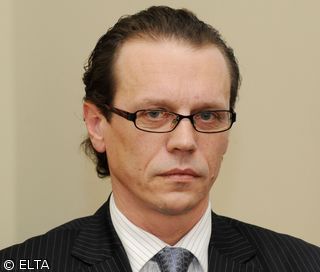Algirdas Šemeta, Commissioner for Taxation, Customs, Audit and Anti-fraud, is visiting Moscow today to discuss ways in which customs cooperation between the EU and Russia can be reinforced.
 Algirdas Šemeta, Commissioner for Taxation, Customs, Audit and Anti-fraud, is visiting Moscow today to discuss ways in which customs cooperation between the EU and Russia can be reinforced. Among the issues he will be discussing with his counterparts is the establishment of a Strategic Framework to facilitate trade between both sides, while ensuring the security of the supply chain and the fight against fraud.
Algirdas Šemeta, Commissioner for Taxation, Customs, Audit and Anti-fraud, is visiting Moscow today to discuss ways in which customs cooperation between the EU and Russia can be reinforced. Among the issues he will be discussing with his counterparts is the establishment of a Strategic Framework to facilitate trade between both sides, while ensuring the security of the supply chain and the fight against fraud.
Commissioner Šemeta said: "The EU and Russia are important trading partners, and customs plays a crucial role in ensuring the smooth and safe trade in goods between both sides. Both the EU and Russia have a strong interest in cooperating in this area and our goal is now to see how we can further strengthen this cooperation."
Russia is the EU’s third largest trading partner after China and the USA. In 2009, the EU exported €65.5 billion worth of goods to Russia and imported around €115 billion worth of products. Moreover, these volumes can be expected to increase further with Russia’s planned WTO accession and the establishment of the Customs Union between Russia, Belarus and Kazakhstan. Given that every single product traded between both sides has to pass through Customs, strong cooperation and efficient systems in this field are essential. Up to now, lengthy and complicated customs procedures and poor customs infrastructure in Russia have led to waiting times of up to 40 hours for consignments waiting to cross the border. This disrupts smooth trade between both sides and can be expensive and burdensome for businesses.
Recognising the fundamental importance of Customs in ensuring good trade flows, Commissioner Šemeta has put this issue at the top of his agenda for his first trip to Moscow. He will meet with Andrei Belyaninov, Chairman of the Federal Customs Service, to discuss setting up a comprehensive Strategic Framework for Customs Cooperation. This Framework should be based on the mutual interest of both sides in Russia's drive to modernise and should cover three priority areas: fluid and safe trade lanes; risk management and the fight against fraud; and customs modernisation. Among the concrete measures envisaged so far within the Strategic Framework are the setting up of an Early Warning Mechanism to avoid trade flow disruptions and congestion problems, the exchange of good practices, the development of risk management and streamlining Russia's border agencies.
Commissioner Šemeta will also meet with representatives of the Association of European Businesses in Russia to discuss customs cooperation between the EU and Russia and to exchange views on where they see the priorities to lie.
Background
In 2007, the EU and Russia agreed on a customs cooperation strategy in an attempt to solve the congestion at the EU-Russia border. This strategy set three priorities for action: reform of Russian customs and border procedures; advance transmission of customs information from the EU to the Russian authorities; and improvement of cross-border customs and transport infrastructure. While this customs cooperation strategy has helped improve things somewhat, the EU would like to step up the cooperation and renew the commitment from both sides to addressing problems in this area. This is the basis for the Commissioner’s visit and the work to establish the Strategic Framework for Customs Cooperation.